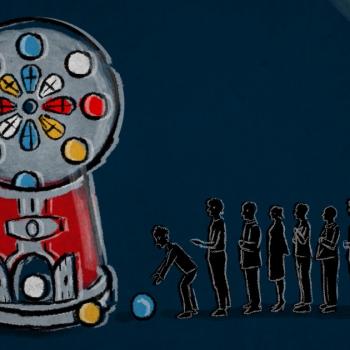This article is Part 1 in my Patheos Head to Head Debate with John Mark Reynolds of Eidos blog. The question: is a deity necessary for morality?
“Is a deity necessary for morality?” At the risk of sounding Clintonesque, it really depends on how you define “morality.” Even so, the answer is by and large, “no.” To explain, I want to first look at why many Christians struggle with the idea that one can be moral without God but then I’ll reveal why it’s possible–at least to a reasonable extent.
The Moral Christian: Not (Mainly) About “Getting Along”
As I note in my book, Broken Gods: Hope, Healing, and the Seven Longings of the Human Heart, Christians tend to think that people can’t be moral without God because, for Christians, (SURPRISE!) morality isn’t primarily concerned with regulating our relationship with ourselves, our community, and creation. These are essential, but secondary, considerations.
Rather, for a Christian, being moral is really about conversion and transformation; that is, conforming my inner longings and outward actions to the divine order so that I can fulfill my ultimate destiny in Christ. Christianity believes in God -given, objective, constant, immutable, moral laws by which the universe is governed. We call this, Natural Law, “the law written on human hearts and minds” (Heb 10:16). Christians believe we must learn to conform to these laws, not out of slavish devotion to a taskmaster God, but out of the belief that following the Natural Law leads to both earthly and eternal fulfillment. Christians often struggle to conceive of a morality without God because, for us, the actual goal of the moral life is not just getting along with others, but ultimately, becoming “divine” (c.f., 2Ptr 1:4) ourselves. (As St. Thomas Aquinas put it, “The son of God became man so that men might become gods.”) People can’t achieve divinization (aka, deification/theosis) by practicing an earth-bound morality that is interested merely in going along to get along.
Theory vs. Reality
That said, believing in an objective morality that leads to divinization is one thing. Actually making moral decisions according to this process is another. In fact, research shows that most people–theists or no–rely on more mundane modes moral reasoning that, practically-speaking, have little, if anything to do with God. Most moral decision making–even for theists–is almost universally non-theistic.
Morality without God: 2 Approaches.
Psychologists who study moral development note at least two general, non-theistic approaches to moral reasoning; emotionally-based morality and socially-based morality.
Emotionally-Based Morality (e.g., “Eww…Gross!” & “Tit for Tat” Morality) —For people who have a more reaction-based morality, anything that seems disgusting, strange, threatening to my development, or hindering of my goals is considered morally “bad” while things that seem palatable, familiar, encouraging of my development, and supportive of my goals is considered morally “good.” Developmental psychologist, Lawrence Kohlberg, called this, “Pre-conventional morality.” At its root, it is childish (literally), selfish, and narcissistic, but it still enables people to be at least basically pro-social, because it benefits them to do so.
Socially-Based Morality (e.g, “Coffee Klatch” & “Legal Eagle Morality”) —Those who display more socially-based morality are willing to sacrifice what their reactions tell them is good or bad based on what their social circle (friends and family) consider “good” or what the law says is “right.” Kohlberg considered this “conventional” morality because this person considers social conventions (e.g., social mores and laws) to be at least as important, if not more so, than his or her own personal feelings.
While social morality is a somewhat more reliable moral guide than reaction-based morality, it too, can change on a dime and tends to be somewhat rootless. You can see what might be called “coffee klatch morality” reflected in a person’s instantaneous reversal of her opinion on the morality of, say, abortion or gay marriage because she suddenly discovers that her best friend had an abortion or her cousin is gay. Similarly, a good example of “legal eagle morality” might be when a community that previously opposed gambling suddenly polls more favorably toward it once an ordinance allowing a casino to open in town is passed. In either case, the morality of the thing, itself, hasn’t changed, but the view of whether supporting it or opposing such an act is “sociable” or “lawful” has changed. People want to be considered agreeable or lawful, so they adjust their opinions to correspond with the circles in which they run.
Mercy Me
These are, by far, the most common approaches to moral decision making for all people–theists and non-theists–and neither has anything to do with God except that, perhaps God, in his mercy, recognizing that many people will struggle to find him, gives humanity a way to at least somewhat peaceably get along without him in the meantime.
As I mentioned at the beginning, there are certainly more complicated approaches to moral reasoning that may, arguably require belief in God. But that isn’t the question I was asked to debate. Based on the data, the fact is, people can be at least basically moral without having any sense of a deity at all because the vast majority of moral decisions are rooted not in our sense of transcendence, but in our reactive and social consciousness.
This week’s question was inspired by Patheos Atheist blogger Peter Mosley’s story on Theism’s Morality Glitch.

















